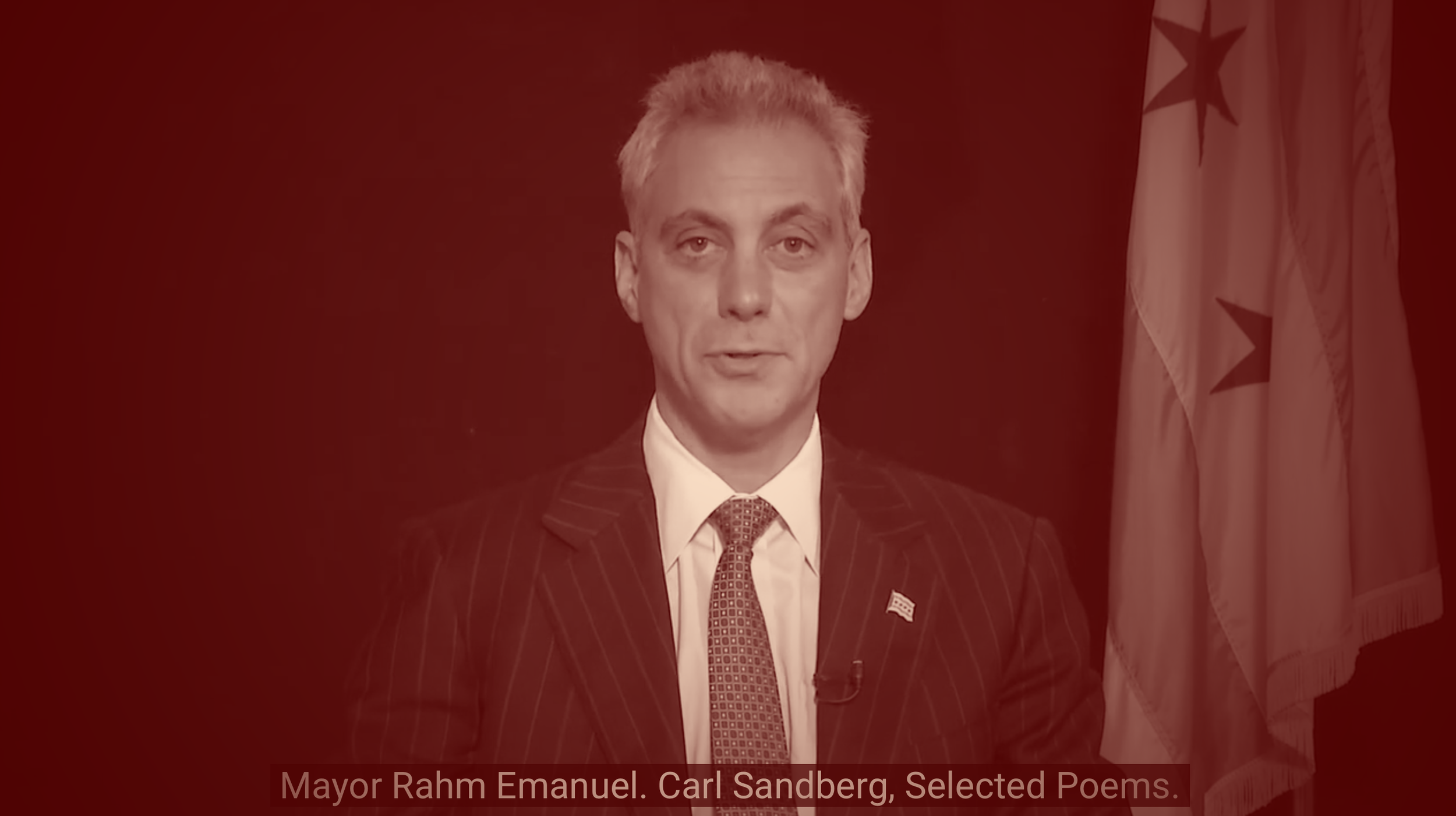Why America Needs Less Therapy and More “Chicago”
Last week U.S. District Judge Sara Ellis took the extraordinary step of reciting Carl Sandburg’s 1914 composition “Chicago” in court before curbing federal agents’ use of force in Chicago. The 111 year old composition “Chicago,” is known for praising the town’s working-class roots and coining the “City of the Big Shoulders” moniker. “This is a vibrant place, brimming with vitality and hope, striving to move forward from its complicated history,” Ellis said, juxtaposing her vision with the Trump administration’s portrayal, which the President described as a city “in a vice hold of violence, ransacked by rioters and attacked by agitators.”'
It’s also happens to be Rahm Emanuel’s favorite poem. (Watch his reading of it below.) And if you read the poem carefully, this should be no surprise to anyone who has followed him.
In Times Like These, Give Us a Street Fighter, Not a Storyteller
Rahm Emanuel likes Carl Sandburg’s “Chicago,” which makes sense, because if that poem ever got up, put on a suit, and started swearing at people to get things done, it would look a lot like Rahm. Sandburg’s city is no postcard. It’s a place that smells like work and sounds like argument. The stockyards, the freight yards, the smoke, the noise; none of it is cute. And Rahm never tried to be cute either. He came up in a town where if you’re not tough, you’re gone, and if you’re too precious about it, people stop listening. He’s a Chicago guy who doesn’t spend a bunch of time putting up gold crap up all over his office. A Chicago guy who as a teenage Arby’s employee sliced off his middle finger while cleaning a roast beef slicer. (But he still uses it.)
Sandburg wrote about a city that knew its sins and didn’t bother pretending otherwise. Chicago gets called crooked, violent, rough, and instead of clutching its pearls, it shrugs and says: sure—and we’re still building, still hustling, still standing. That’s Rahm’s whole deal. Nobody needs to explain to him that politics can be ugly; he’s lived it. Budgets balanced, hard choices made, people mad at him on all sides. That’s not a branding problem to him, that’s the job description.
And that’s exactly what the Democratic Party is missing right now. Too many “leaders” talking like consultants and acting like op-ed journalists and reviewers instead of builders, afraid of online backlash from the loud, obnoxious, backbenching few. They want a movement that never gets its hands dirty, never makes anyone upset, never admits tradeoffs. Meanwhile, ordinary people are stuck with hospitals closing, bills mounting, kids slipping behind, and a political class that looks terrified of saying anything out loud that might offend the cacophony of well-funded special interest groups. Sandburg’s city didn’t ask to be admired; it demanded to be useful. Rahm belongs to that school.
America, for its trouble, is stuck in one of those moments where everyone seems exhausted from fighting and complaining, but nobody’s quite willing to do the ugly work of governing - leaving a hole filled by Trumpism. That’s where a “City of Big Shoulders” kind of leadership matters. Someone who expects to be yelled at, expects to be second-guessed, and keeps going anyway. Rahm isn’t offering a fantasy of purity or puffery. He’s offering something tougher and more honest: the promise that he’ll walk into the fight, take the punches, make the deals, and get results for the people who don’t have time to attend panels about “our democratic moment.” In times like these, the country doesn’t need a poet in the White House. It needs someone who understands why that poem was written and is willing to live up to it.
“Chicago” by carl sandburg, 1914
Hog Butcher for the World,
Tool Maker, Stacker of Wheat,
Player with Railroads and the Nation's Freight Handler;
Stormy, husky, brawling,
City of the Big Shoulders:
They tell me you are wicked and I believe them, for I have seen your painted women under the gas lamps luring the farm boys.
And they tell me you are crooked and I answer: Yes, it is true I have seen the gunman kill and go free to kill again.
And they tell me you are brutal and my reply is: On the faces of women and children I have seen the marks of wanton hunger.
And having answered so I turn once more to those who sneer at this my city, and I give them back the sneer and say to them:
Come and show me another city with lifted head singing so proud to be alive and coarse and strong and cunning.
Flinging magnetic curses amid the toil of piling job on job, here is a tall bold slugger set vivid against the little soft cities;
Fierce as a dog with tongue lapping for action, cunning as a savage pitted against the wilderness,
Bareheaded,
Shoveling,
Wrecking,
Planning,
Building, breaking, rebuilding,
Under the smoke, dust all over his mouth, laughing with white teeth,
Under the terrible burden of destiny laughing as a young man laughs,
Laughing even as an ignorant fighter laughs who has never lost a battle,
Bragging and laughing that under his wrist is the pulse, and under his ribs the heart of the people,
Laughing!
Laughing the stormy, husky, brawling laughter of Youth, half-naked, sweating, proud to be Hog Butcher, Tool Maker, Stacker of Wheat, Player with Railroads and Freight Handler to the Nation.
